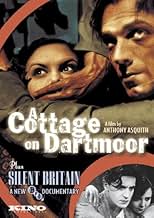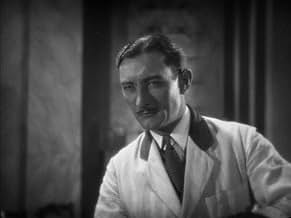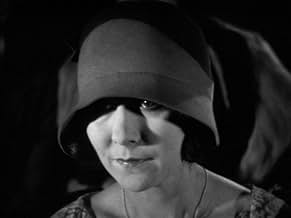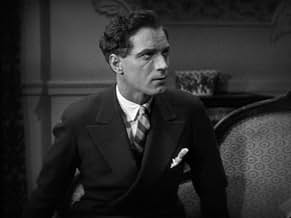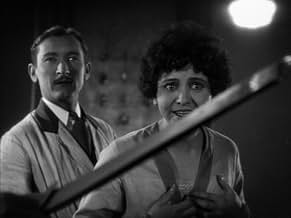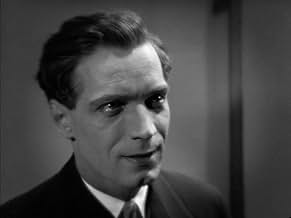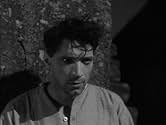A Cottage on Dartmoor
- 1930
- 1h 28min
VALUTAZIONE IMDb
7,5/10
1297
LA TUA VALUTAZIONE
Aggiungi una trama nella tua linguaA former barber escapes from a high security prison. Flashback story of an escape from the lonely, high-security Dartmoor Prison.A former barber escapes from a high security prison. Flashback story of an escape from the lonely, high-security Dartmoor Prison.A former barber escapes from a high security prison. Flashback story of an escape from the lonely, high-security Dartmoor Prison.
- Regia
- Sceneggiatura
- Star
Hans Adalbert Schlettow
- Harry - a Dartmoor Farmer
- (as Hans Schlettow)
Anthony Asquith
- Bespectacled Man in Cinema
- (non citato nei titoli originali)
Judd Green
- Customer
- (non citato nei titoli originali)
Recensioni in evidenza
10sunlily
A Cottage on Dartmoor is a late British silent of stunning clarity and poetic justice. The use of the camera to caress the homey accents in Norah's boarding house, the use of mirrors to dramatize the lives and thoughts of the characters, the elongated camera angles of the escaped convict jumping from captivity to freedom, and running from his past into redemption. All of this and more make this late silent itself almost a valentine to the end of the silent era and the dawn of sound.
One of the most poignant scenes in the movie demonstrates this by taking us to a "talkie" that nonetheless has a full orchestra that the camera hones in on and romanticizes.
While this is a tale of obsession, it is also a story of love that has many emotionally tense elements that Norah Baring and Uno Henning handle with dignity and grace. I'm very surprised that I've not heard more about either of these actors.
A Cottage on Dartmoor is a very beautifully realized film that probably wouldn't have been as effective had it been made as a sound movie.
One of the most poignant scenes in the movie demonstrates this by taking us to a "talkie" that nonetheless has a full orchestra that the camera hones in on and romanticizes.
While this is a tale of obsession, it is also a story of love that has many emotionally tense elements that Norah Baring and Uno Henning handle with dignity and grace. I'm very surprised that I've not heard more about either of these actors.
A Cottage on Dartmoor is a very beautifully realized film that probably wouldn't have been as effective had it been made as a sound movie.
Uno Henning escapes from Dartmoor Prison and makes it to a small cottage where he confronts Norah Baring. We see in flashback that he worked in a barber shop and had a crush on Baring. After she (kind of) unintentionally leads him on, he discovers that she plans on marrying customer Hans Adalbert Schlettow. Bad things happen.
The last of four silent films made by Anthony Asquith, it was made so much on the cusp of talking films that the characters go see one in the film. It's a striking visual film with strong expressionist elements and odd, dynamic editing. It's also about 15 minutes too long.
Asquith cameos as a customer in the quite long movie theater scene.
The last of four silent films made by Anthony Asquith, it was made so much on the cusp of talking films that the characters go see one in the film. It's a striking visual film with strong expressionist elements and odd, dynamic editing. It's also about 15 minutes too long.
Asquith cameos as a customer in the quite long movie theater scene.
Stylish and tense melodrama which features an opening scene where a man who has just escaped from prison is seen crossing the stark and gloomy moors, the sky darkened by black clouds, and not much more to be seen than a few wandering cows and a dark, bare tree. A woman cares for her baby at a lonely, isolated cottage, the man slithers in and confronts her and - she knows him! Now in flashback we see the background story of these two, Joe and Sally, co-workers in a barber shop where he gives men a shave and a haircut while she manicures their nails and gives the customers flirtatious smiles. This prompts more than just jealousy in this man - he pursues her, she doesn't really seem to like him that much but does agree to go out with him and they spend an evening together at her boarding-house where numerous well-meaning, slightly interfering old-timers seem to live (and he gets some pretty scary expressions on his face in what seems to be his desperation to kiss her). When she agrees to go see a "talkie" with a certain male customer, Joe turns stalker as he sneaks into the theater, secretly plants himself in the row behind them, and in an amazingly photographed scene shot using rapid-paced editing, we never see the film they are watching - instead the camera cuts between audience members plus Sally reacting as they watch the film, the orchestra playing, and Joe - who is not watching the film at all, but rather he's glaring in a steady gaze at Sally and her "date" in front of him.
This is a really excellent, well done film featuring loads of interesting cinematography - softly filtered lighting and shadowy scenes, facial close-ups, and lots of fast cutting. The guard who discovers Joe's escape is seen mainly in shadows against the cell walls, the menacing face of the convict as the camera quickly zooms in to show his face as the woman recognizes him, Joe sharpening his razor, quickly cut between two gossiping female co-workers, as he contemplates murder! The Kino DVD of this features a great looking black and white print and nicely done piano score that helps enhance the tension in the film. A great silent film, well worth seeing.
This is a really excellent, well done film featuring loads of interesting cinematography - softly filtered lighting and shadowy scenes, facial close-ups, and lots of fast cutting. The guard who discovers Joe's escape is seen mainly in shadows against the cell walls, the menacing face of the convict as the camera quickly zooms in to show his face as the woman recognizes him, Joe sharpening his razor, quickly cut between two gossiping female co-workers, as he contemplates murder! The Kino DVD of this features a great looking black and white print and nicely done piano score that helps enhance the tension in the film. A great silent film, well worth seeing.
COTTAGE ON DARTMOOR: an expressionistic and claustrophobic account of sexual obsession and jealousy, very Hitchockian in the way it deals with the resulting crescendo of suspense, especially in connection with a key throat-cutting in a barber's chair incident. Asquith was a director who grew stodgy as his career entered into the sound era, viz his terribly British adaptions of Rattigan, but the present film (1929) is rather an eye opener. One standout scene is set within a cinema, partly a comment on the imminent and creatively burdensome coming of clunky sound, and which contains an extended eye opening use of editing, cutting about within an audience as the beady-eyed boy friend watches his victims - a bravura sequence which ought to be much better known to cineastes.
Sally lives in a cottage on Dartmoor when, on a dark and quiet night, a man breaks into her home having just escaped the high-security prison across the moors. That man is none other than Joe, a former barber's assistant at the place where Sally used to be a manicurist. As they connect eyes, the audience flashback to the times where Joe and Sally once worked together and he had tried to woo her at the beginning of a series of events that now brought them to this place.
The BBC's summer of British films this year turned out to be better than I expected it to be because, instead of wheeling out Zulu, Dam Busters and all the usual British films, they actually screened lots of films that I had not seen or, in some cases, heard of. Of course this meant that some of them were not any good but at least it was an attempt to fresh up the idea of what British cinema is. A Cottage on Dartmoor is a good example of this as it is rare for silent films to be screened on television and far more rare for them to be British silent films. I had never seen this and I enjoyed it a great deal.
Narrative-wise the film opens with an element of fear and tension before jumping back to more of a comedy and romance. As this builds back to where it started again for a good finish. The film is maybe 15 minutes too long for the material to sustain but otherwise it is well delivered. The funny bits are amusing, the tense bits tense and the romance nicely melodramatic and tragic, however it is the delivery that makes the film specifically that of Asquith and his cinematographer. Visually the film matches the tone of the film really well opening and closing with sharp shadows on the moors, and enjoying a bright and carefree air early in the barbershop scenes. The images are sharp and really well formed with plenty of clever shots. Mirrors are used well, conversations represented by stock footage, flashbacks delivered within flashbacks and a great scene where we watch a cinema audience reacting to a film they are watching. Visually and technically it is very impressive and I enjoyed it a great deal.
Deserves to be screened a lot more than it is and be seen by more people than it is, but credit to the BBC for showing it recently.
The BBC's summer of British films this year turned out to be better than I expected it to be because, instead of wheeling out Zulu, Dam Busters and all the usual British films, they actually screened lots of films that I had not seen or, in some cases, heard of. Of course this meant that some of them were not any good but at least it was an attempt to fresh up the idea of what British cinema is. A Cottage on Dartmoor is a good example of this as it is rare for silent films to be screened on television and far more rare for them to be British silent films. I had never seen this and I enjoyed it a great deal.
Narrative-wise the film opens with an element of fear and tension before jumping back to more of a comedy and romance. As this builds back to where it started again for a good finish. The film is maybe 15 minutes too long for the material to sustain but otherwise it is well delivered. The funny bits are amusing, the tense bits tense and the romance nicely melodramatic and tragic, however it is the delivery that makes the film specifically that of Asquith and his cinematographer. Visually the film matches the tone of the film really well opening and closing with sharp shadows on the moors, and enjoying a bright and carefree air early in the barbershop scenes. The images are sharp and really well formed with plenty of clever shots. Mirrors are used well, conversations represented by stock footage, flashbacks delivered within flashbacks and a great scene where we watch a cinema audience reacting to a film they are watching. Visually and technically it is very impressive and I enjoyed it a great deal.
Deserves to be screened a lot more than it is and be seen by more people than it is, but credit to the BBC for showing it recently.
Lo sapevi?
- BlooperJoe's coworker reaches down to pick up the movie tickets with his right hand, but the close-up shows his left hand grabbing them.
- ConnessioniFeatured in Cinema Europe: The Other Hollywood (1995)
I più visti
Accedi per valutare e creare un elenco di titoli salvati per ottenere consigli personalizzati
Dettagli
- Tempo di esecuzione1 ora 28 minuti
- Colore
- Mix di suoni
- Proporzioni
- 1.20 : 1
Contribuisci a questa pagina
Suggerisci una modifica o aggiungi i contenuti mancanti

Divario superiore
By what name was A Cottage on Dartmoor (1930) officially released in Canada in English?
Rispondi
